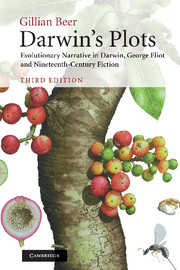Book contents
- Frontmatter
- Contents
- Foreword by George Levine
- Preface to the first edition
- Preface to the second edition
- Preface to the third edition
- Introduction
- Part I Darwin's language
- Part II Darwin's plots
- Part III Responses: George Eliot and Thomas Hardy
- 5 George Eliot: Middlemarch
- 6 George Eliot: Daniel Deronda and the idea of a future life
- 7 Descent and sexual selection: women in narrative
- 8 Finding a scale for the human: plot and writing in Hardy's novels
- 9 Darwin and the consciousness of others
- Notes
- Select bibliography of primary works
- Further reading related to Charles Darwin
- Index
6 - George Eliot: Daniel Deronda and the idea of a future life
Published online by Cambridge University Press: 04 August 2010
- Frontmatter
- Contents
- Foreword by George Levine
- Preface to the first edition
- Preface to the second edition
- Preface to the third edition
- Introduction
- Part I Darwin's language
- Part II Darwin's plots
- Part III Responses: George Eliot and Thomas Hardy
- 5 George Eliot: Middlemarch
- 6 George Eliot: Daniel Deronda and the idea of a future life
- 7 Descent and sexual selection: women in narrative
- 8 Finding a scale for the human: plot and writing in Hardy's novels
- 9 Darwin and the consciousness of others
- Notes
- Select bibliography of primary works
- Further reading related to Charles Darwin
- Index
Summary
Daniel Deronda is a novel haunted by the future, that purest and most taxing realm of fiction. For the first time in George Eliot's work the dependence of the future on the past is brought into question. Earlier in her career she had found a meta-religious security in the ‘great concept of universal sequence’, ‘the gradual reduction of all phenomena within the sphere of established law, which carries as a consequence the rejection of the miraculous’. Causal sequence had been the organising principle both of her morality and of her practice as a novelist.
In Daniel Deronda causal sequence is disturbed and pressed upon by resurgence, synchronicity, the miraculous, the hermeneutic, and by unassuageable human need. In the uniformitarian ordering of Middlemarch events, however seemingly catastrophic, are prepared for by the slight incipient movements, crumblings, pressures, erosions, and siltages observable to an immeasurably patient eye, whether it be that of Uriel in the sun ‘watching the progress of planetary history’ (as she writes in Middlemarch) or that of the novelist exempted from the partiality and subjectivity of her personages. The outcome, though melancholy in tone, is reassuring to the reader in that it creates an infinitely knowable world. Our discoveries keep pace with the increasing insight into relations and connections that the work offers us – though the sequences of Middlemarch do not share that optimistic sense of a development preparing for man's betterment which we remember from her earliest essays: ‘Every past phase of human development is part of that education of the race in which we are sharing; every mistake, every absurdity into which poor human nature has fallen, may be looked on as an experiment of which we may reap the benefit.’
- Type
- Chapter
- Information
- Darwin's PlotsEvolutionary Narrative in Darwin, George Eliot and Nineteenth-Century Fiction, pp. 169 - 195Publisher: Cambridge University PressPrint publication year: 2009



